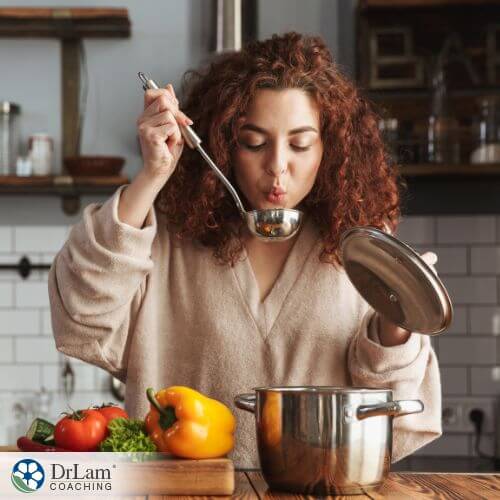 If you frequently feel anxious or overwhelmed, cooking and eating can become an occasion met with dread. Cooking and eating can become a chore rather than a joy and can worsen feelings of overwhelm. But if you do frequently feel anxious or overwhelmed, eating certain foods may help reduce this feeling. Along with less overwhelming foods, this article will look at how you can take the overwhelm from the cooking process for a more calming and relaxing experience.
If you frequently feel anxious or overwhelmed, cooking and eating can become an occasion met with dread. Cooking and eating can become a chore rather than a joy and can worsen feelings of overwhelm. But if you do frequently feel anxious or overwhelmed, eating certain foods may help reduce this feeling. Along with less overwhelming foods, this article will look at how you can take the overwhelm from the cooking process for a more calming and relaxing experience.
Beyond keeping the hunger wolves at bay, food also directly impacts your mental health. This is done in various ways. One of the ways that food can affect your mental health is through your gut.
95% of serotonin, a brain hormone that is a natural antidepressant is made in your gut (1). Therefore if your gut is unhealthy, this serotonin may not be able to be produced. This reduces levels of serotonin and can negatively impact your mental health.
Your gut health relies on your microbiome, or the bacteria in your gut. A healthy microbiome is one with a high amount of beneficial bacteria within it, while high amounts of harmful bacteria cause problems. There are many factors that can negatively affect gut health. Foods that can negatively affect the gut microbiome include:
On the other end of the spectrum, some foods can impact your mental health positively and can help to reduce anxiety and feelings of overwhelm.
There is a wide variety of different foods that can promote calmness, but the top less overwhelming foods include:
These foods help boost your gut health, nourish your body, and reduce anxiety and stress, lowering feelings of overwhelm as well.
These less overwhelming foods can indirectly help to reduce feelings of overwhelm by improving the health of your gut microbiome. Fermented food products are rich in probiotics, also known as beneficial bacteria, which can help to repopulate your gut and improve gut health. This will help to improve the release of beneficial brain hormones such as serotonin.
Carbohydrates, unlike protein, can stimulate the release of serotonin in the body helping to enhance your mood and reduce feelings of overwhelm (3). Unrefined carbohydrates are higher in fiber, and not only will they help to stimulate the release of serotonin, but the extra fiber in these foods will help to promote a healthy gut.
Citrus is a well-known source of vitamin C, and berries, specifically strawberries, are also a great source of vitamin C. This vitamin has many benefits, including helping to reduce feelings of stress and anxiety. This could be due to vitamin C indirectly affecting one of the main stress hormones, cortisol, through its antioxidant action.
Fish, specifically cold water fish, are high in the fatty acid, omega-3. This nutrient not only helps to reduce inflammation but also has an important effect on your brain health. It helps to preserve memory, enhance focus, and improve mood, reducing feelings of stress and anxiety. It's recommended that you consume low-mercury fish twice a week to help keep your levels of omega-3 at an optimal level.
There are a range of different teas such as chamomile, lavender, and green tea that contain several beneficial compounds that can help to reduce inflammation in your brain, improve memory, and promote a feeling of calmness.
Interestingly not only do the beneficial compounds do this but the tea itself. Research suggests that just holding a warm cup of tea can help to induce a feeling of warmth and friendliness (4).
 Whilst there are a wide variety of less overwhelming foods, there are also foods to be mindful of that can contribute towards feelings of overwhelm. Foods that can increase the risk of overwhelm and/or overstimulation include foods high in:
Whilst there are a wide variety of less overwhelming foods, there are also foods to be mindful of that can contribute towards feelings of overwhelm. Foods that can increase the risk of overwhelm and/or overstimulation include foods high in:
When you think of cooking, you may just think of the end product, the tasty food. However, if you think about it, cooking engages all of your five senses. The sizzling of the pan, the smell of the food, the look of the food, the different textures of the different ingredients, and the taste. On top of this, cooking can bring a sense of socializing and include laughing, talking, and bringing together of a group of people such as family. There is also the aspect of thinking about cooking and the act of doing it, which requires energy.
For some individuals, this can be a bombardment of their senses and something that may be dreaded or avoided. Individuals who are at risk for feeling overstimulated from cooking and eating include individuals who experience the following conditions:
It is also important to note here that individuals who are sleep deprived, sensitive to stress, or work in an environment that has many different stimuli are at risk of being overstimulated by the cooking and eating process.
Whilst cooking and eating be an overwhelming experience there are steps we take to make it less overwhelming and more enjoyable. These steps include:
 Stress, specifically chronic stress, can increase feelings of overwhelm. Your NeuroEndoMetabolic (NEM) Stress Response System, is your body's natural system for managing stress. Chronic stress can cause Adrenal Fatigue Syndrome (AFS). This is the non-Addison form of adrenal dysfunction, when your body cannot keep up with life's chronic stressors. In AFS, imbalances in the NEM system occur and can result in a wide range of symptoms.
Stress, specifically chronic stress, can increase feelings of overwhelm. Your NeuroEndoMetabolic (NEM) Stress Response System, is your body's natural system for managing stress. Chronic stress can cause Adrenal Fatigue Syndrome (AFS). This is the non-Addison form of adrenal dysfunction, when your body cannot keep up with life's chronic stressors. In AFS, imbalances in the NEM system occur and can result in a wide range of symptoms.
If there is an imbalance within the Neuroaffect circuit of the NEM, symptoms such as anxiety, challenges with staying and going to sleep, and stress intolerance will start to occur. These symptoms may increase feelings of overwhelm. Healing from AFS will help with these feelings, and using less overwhelming foods may also help to promote feelings of calmness.
Many individuals can experience feelings of overwhelm, anxiety, and fatigue. There are many factors that can contribute to this, including nutrition. However, some less overwhelming foods can help fortify your body against anxiety and promote a feeling of calm. These foods work in a variety of different ways such as promoting gut health and stimulating the release of serotonin.
If you are finding yourself feeling more overwhelmed than usual or are dealing with chronic stress, the team at Dr. Lam can help. We offer a free, no-obligation phone consultation at +1 (626) 571-1234 where we will privately discuss your symptoms and various options. You can also send us a question through our Ask The Doctor system by clicking here.
Appleton J. "The Gut-Brain Axis: Influence of Microbiota on Mood and Mental Health." Integr Med (Encinitas), vol. 17, no. 4, 2018 Aug. pp. 28-32. https://www.ncbi.nlm.nih.gov/pmc/articles/PMC6469458/
Zhang P. "Influence of Foods and Nutrition on the Gut Microbiome and Implications for Intestinal Health." Int J Mol Sci, vol. 23, no. 17, 2022 Sep. pp. 9588. https://www.ncbi.nlm.nih.gov/pmc/articles/PMC9455721/
Wurtman RJ and Wurtman JJ "Brain Serotonin, Carbohydrate-Craving, Obesity and Depression." Obes Res, vol. 4, 1995 Nov. https://pubmed.ncbi.nlm.nih.gov/8697046/
Williams LE and Bargh JA. "Experiencing Physical Warmth Promotes Interpersonal Warmth." Science, vol. 322, no. 5901, 2009 Sep. pp. 606-7. https://www.ncbi.nlm.nih.gov/pmc/articles/PMC2737341/
Less overwhelming foods can help to provide relief from mental health conditions, but they are not a cure. However, if you are experiencing conditions such as anxiety due to poor gut health, then these foods may help to enhance your gut health and reduce further mental health problems.